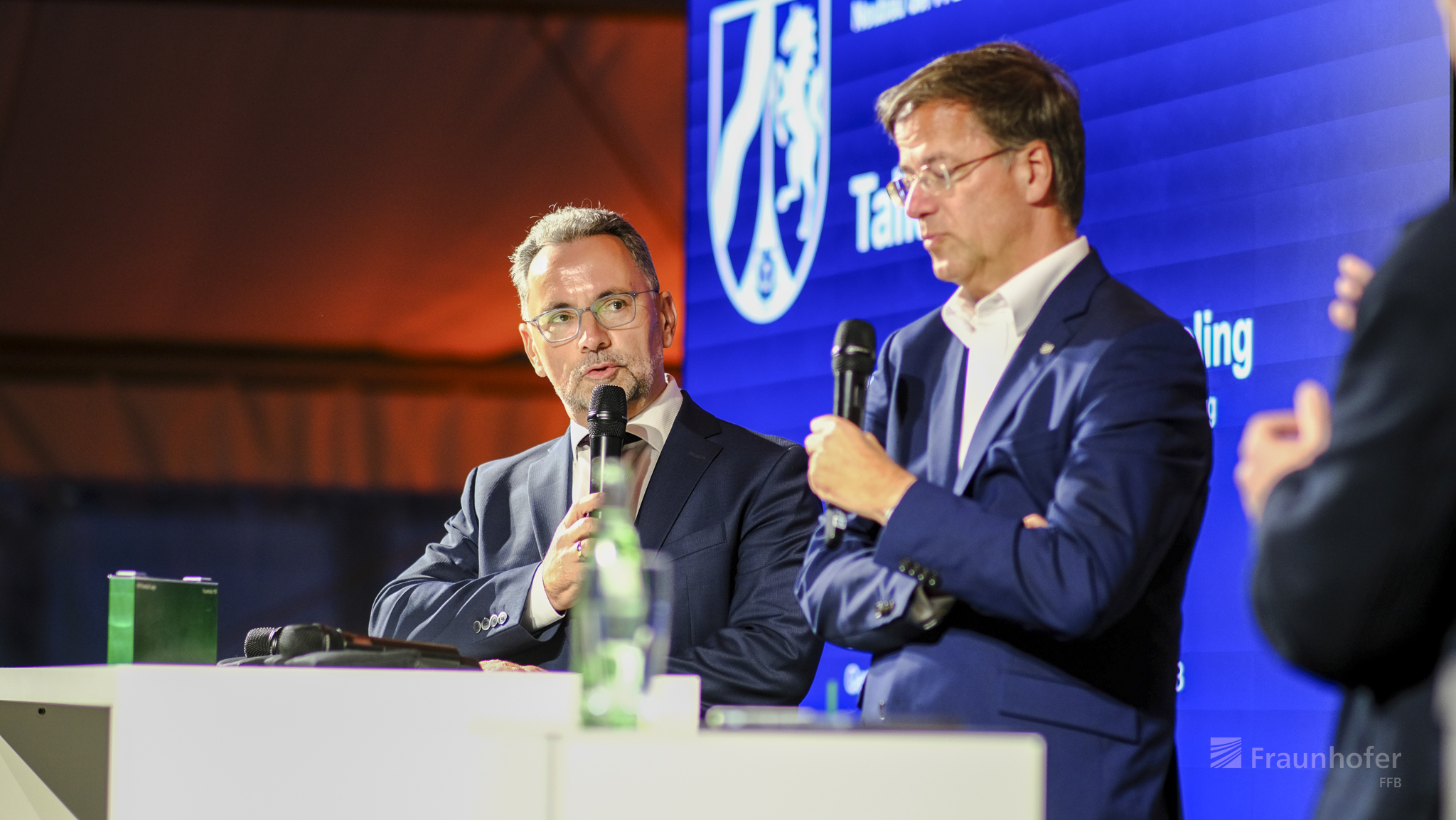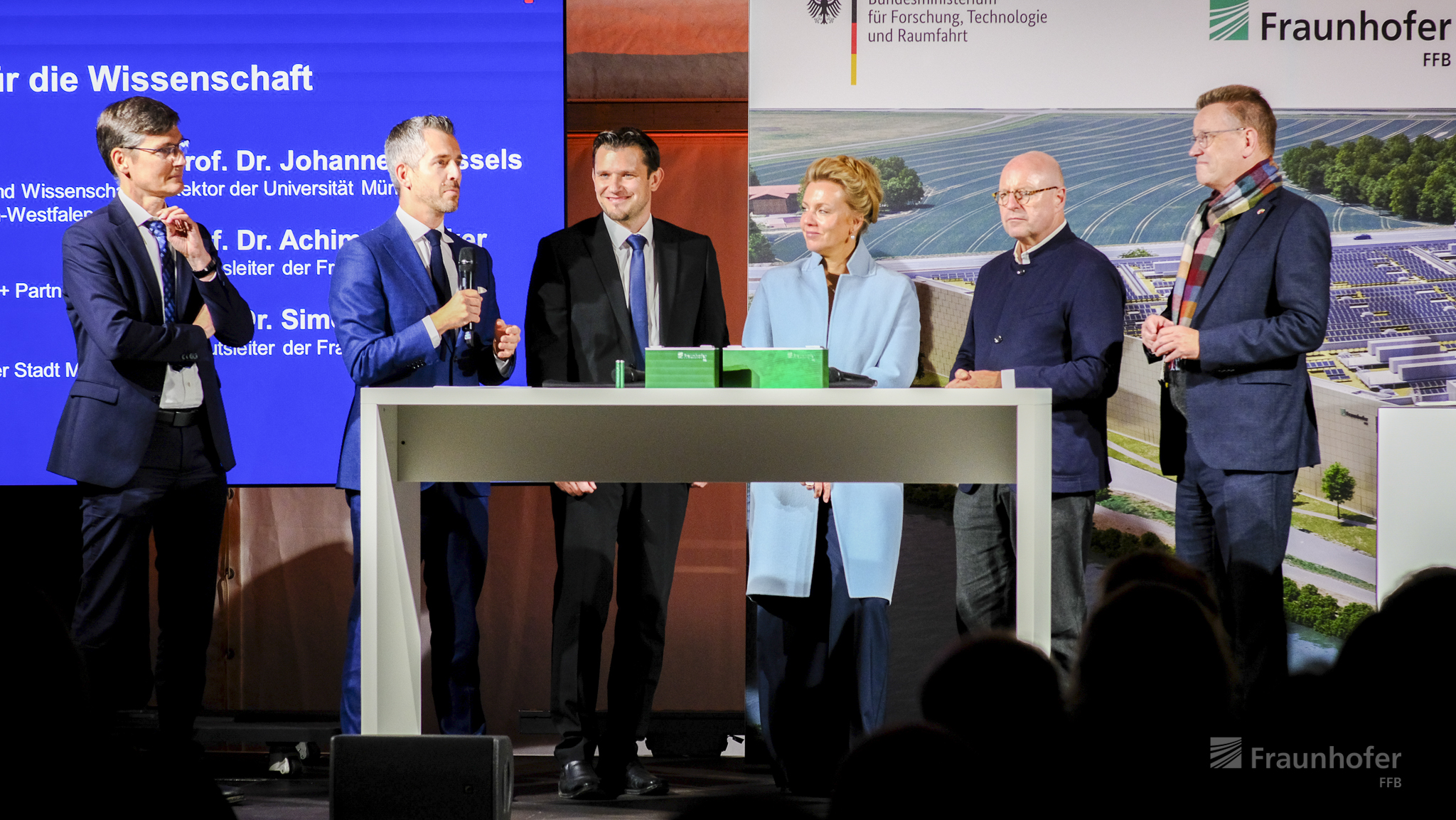Future Location North Rhine-Westphalia: Groundbreaking Ceremony for Next-Generation Battery Production in Münster
Minister Neubaur, Minister Brandes, State Secretary Jungk and representatives of the Fraunhofer-Gesellschaft lay the foundation stone for the second construction phase of the Research Fabrication Battery Cell.

Münster. The future of battery production is gaining momentum – right in the heart of North Rhine-Westphalia. Minister for Economic Affairs, Industry, Climate Action and Energy Mona Neubaur, Minister for Culture and Science Ina Brandes, and Dr. Rolf-Dieter Jungk, State Secretary at the Federal Ministry for Research, Technology and Space, today (October 1, 2025) laid the foundation stone in Münster for the second construction phase of the Fraunhofer Research Fabrication Battery Cell (»FFB Fab«). The large-scale research facility for battery cell production processes is scheduled to go into operation in 2028.
Minister for Economic Affairs, Industry, Climate Action and Energy Mona Neubaur: “Especially in uncertain times, we are boldly investing in the future here in North Rhine-Westphalia. Münster is becoming a Europe-wide hotspot for battery research. Modern battery cells make us more technologically independent, secure jobs, and help us bring value creation back to Europe. With our investments, we are setting strong impulses for growth, competitiveness, and sustainable employment. NRW is the land of opportunities – this is where the technologies and jobs of tomorrow are created, and this is where we safeguard our economy.”
Minister for Culture and Science Ina Brandes: “The development of smart batteries is one of the key technologies that will secure prosperity and good jobs in North Rhine-Westphalia. Our future is only conceivable with intelligent batteries. They already have a firm place in people’s everyday lives: for energy supply, for electromobility and smartphones – everywhere we rely on this key technology. In Münster, a unique research facility for the battery cell production of the future is being created, with an enormous pull effect for excellent scientists.”
Dr. Rolf-Dieter Jungk, State Secretary at the Federal Ministry for Research, Technology and Space: “Germany and Europe need their own competitive battery production. To this end, we are establishing the Research Fabrication Battery Cell as a new instrument within the innovation landscape in order to industrialize the battery from research. After the successful start of research operations in the first construction phase, the groundbreaking of the second construction phase marks another milestone on the path to successful battery production.”
Axel Müller-Groeling, Executive Board Member for Research Infrastructures and Digital Transformation of the Fraunhofer-Gesellschaft: “Expertise in battery technology and production is crucial for our industrial future – whether in energy supply, mobility, or robotics. In basic research, Germany is well positioned. But in the transition from research to industrial application and production, we need to improve – especially in the global competition. This is precisely where the Fraunhofer »FFB Fab« comes in: it creates a platform for industry-oriented, flexible production research on the scale of a gigafactory. With today’s groundbreaking, we are taking another important step toward a future-oriented research fabrication. I am very pleased about this milestone on the way to Fraunhofer FFB.”
With the groundbreaking, preparations for battery production at the Hansa BusinessPark in Münster-Amelsbüren are entering the final phase. After intensive preliminary work by the state, the federal government, and the Fraunhofer-Gesellschaft, the goal of developing and producing battery cells in Germany in a sustainable, efficient, and industrially scalable way has moved a big step closer.
The Fraunhofer-Gesellschaft will be the future user of the Research Fabrication Battery Cell. In addition, representatives of Carpus + Partner AG as the general planner, Riedel Bau AG, which is responsible for the structural work, and the state-owned company NRW.Urban as the building owner also took part in the groundbreaking ceremony.
.

Battery research at an international top level
With the planned completion of the large research building at the end of 2027, an additional 20,000 m² of usable research space will be provided. A smaller prefabrication plant with more than 6,000 m² of research space, the so-called »FFB PreFab«, has already been in operation since 2024.
In the large research building of the »FFB Fab«, economically and ecologically sustainable manufacturing processes for cell technologies will be researched and further developed on production lines up to the gigawatt scale. Along the entire value chain of battery cell production, industrial companies will be able to test selected process steps under scientific supervision. In the future, up to 150 scientists will work in Münster on innovative processes for battery production.
The Fraunhofer FFB – one of the largest research construction projects in Germany
The Research Fabrication Battery Cell is one of the largest research construction projects in Germany and is unique worldwide. The facility will play a key role in the development of the next generation of battery cells. It closes the gap between basic research and application on an industrial scale. It is therefore of crucial importance for the sustainable development of electromobility and the energy transition. The facility will not only set new standards in research but will also serve as an innovation center for industry partners.
With the battery ecosystem BatteryCityMünster, which already includes other leading battery research institutions such as the MEET Battery Research Center at the University of Münster and the Helmholtz Institute Münster of Forschungszentrum Jülich, it is already successfully attracting further companies and start-ups.
The state of North Rhine-Westphalia is investing around 320 million euros in land and research buildings in Münster. The federal government is also funding the establishment of research facilities and operations with up to 500 million euros in order to position Fraunhofer FFB as a new instrument in the German and European innovation landscape, to close gaps in the innovation system, and to establish competitive battery production and circularity in Germany and Europe from research. Together, the two partners are thus making a major investment in the future viability of Germany as an industrial location and in an important building block for strengthening Europe’s technological sovereignty in this field of the future.
Download press release and pressphoto
Last modified:

